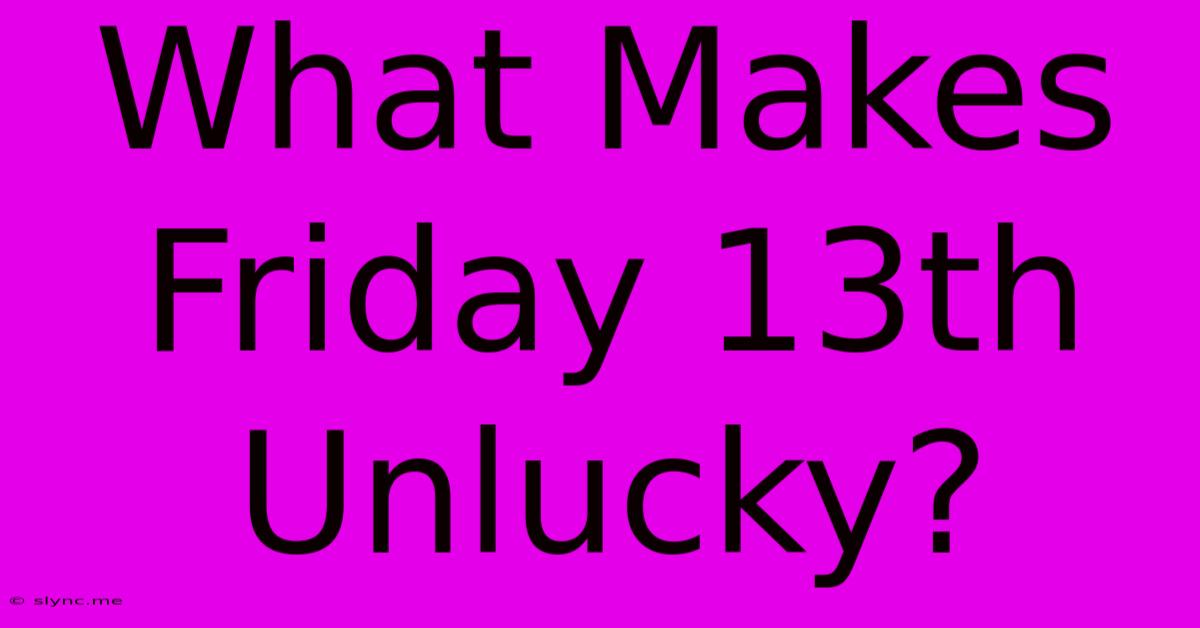What Makes Friday 13th Unlucky?

Discover more detailed and exciting information on our website. Click the link below to start your adventure: Visit Best Website Mrs.Amykhan. Don't miss out!
Table of Contents
What Makes Friday the 13th Unlucky? Unraveling the Superstition
Friday the 13th. The phrase conjures images of black cats, broken mirrors, and impending doom. But where did this pervasive superstition originate, and why does it hold such a grip on our collective imagination? Let's delve into the history and psychology behind this infamous date.
A History Steeped in Fear and Folklore
The apprehension surrounding Friday the 13th isn't a recent phenomenon; its roots stretch back centuries. Several theories contribute to its negative connotation:
Biblical Connections:
Some trace the origins to the Last Supper, where 13 guests sat down, followed by the betrayal and crucifixion of Jesus. The number 13, already associated with misfortune in some cultures, became further tainted by this pivotal event in Christian history. Friday, the day of Jesus' crucifixion, also gained a sinister reputation.
Norse Mythology:
Another possible source lies in Norse mythology. The infamous betrayal of Baldr, the god of light, is said to have occurred on a Friday. The presence of 12 gods at the fateful gathering, along with Loki (the thirteenth guest), further solidifies the association of this number with treachery and ill fortune.
The Psychology of Fear
Beyond historical influences, the power of Friday the 13th also lies in the psychology of superstition. Our brains are wired to look for patterns, even where none exist. This phenomenon, known as apophenia, can lead us to connect unrelated events and attribute meaning to coincidence.
A negative event occurring on a Friday the 13th might become firmly etched in our memory, reinforcing the belief in its ill omen. This is further exacerbated by the confirmation bias, where we tend to notice and remember events that confirm our existing beliefs, while disregarding those that contradict them.
The Modern-Day Impact
Despite its roots in ancient beliefs, Friday the 13th continues to exert a powerful influence on modern society. Many individuals experience paraskevidekatriaphobia, the fear of Friday the 13th, leading to anxiety and avoidance behaviors. Businesses report a noticeable dip in productivity and travel, while some even reschedule significant events to avoid this date.
Debunking the Myth: Is There Real Unluckiness?
Statistically, there's no evidence to suggest that Friday the 13th is inherently more dangerous or unlucky than any other day. Accidents and misfortunes occur every day, regardless of the date. The perceived increase in negative events on Friday the 13th is likely a result of our heightened awareness and expectation of misfortune, influencing our perception of reality.
Embracing the Superstition (or Not!)
Whether you embrace the superstition or view it with skepticism is a matter of personal choice. While there's no scientific basis for the fear, its cultural significance remains undeniable. Perhaps the enduring power of Friday the 13th lies not in its inherent ill-luck, but in its ability to tap into our deepest fears and anxieties, reminding us of the unpredictable nature of life. So, the next time Friday the 13th rolls around, remember the historical context and psychological factors at play—and decide for yourself whether to heed the warnings or embrace the day with a dash of defiant optimism.

Thank you for visiting our website wich cover about What Makes Friday 13th Unlucky?. We hope the information provided has been useful to you. Feel free to contact us if you have any questions or need further assistance. See you next time and dont miss to bookmark.
Also read the following articles
| Article Title | Date |
|---|---|
| Rizdvyaniy Rozprodazh Epic Games Store | Dec 13, 2024 |
| Molod Chelsi Dominuye V Lizi Konferentsiy | Dec 13, 2024 |
| Whats Next For Erin Molan | Dec 13, 2024 |
| Liga Konferentsiy Katastrofa Dlya Lask Talovyerova | Dec 13, 2024 |
| Ukrayina Zaznala Raketnogo Udaru | Dec 13, 2024 |
